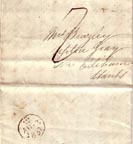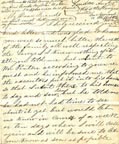Eunice and Ron Shanahan have shared with readers of the Victorian Web this material from their website, Letters from the Past. Click on thumbnails for larger images.
Postal Markings
This letter addressed to Mrs Beazley, Upton Gray Nr. Odiham Hants, from G. Beazley in London, has only two postal markings.

- the London circular evening duty date stamp AU 3 1837. This was of the type in use from 1830-1840 which had serif letters, and the code letter (in this case a W) at the top, and the year in full, in a curve at the bottom, and
- a charge mark of ‘7’, seven pence, the amount charged for carrying the letter a distance of between 30 and 50 miles – Odiham is 41 miles from London. I am surprised that it did not have a backstamp of any kind as usually a town name stamp will give an indication of the route. Odiham is half way between Aldershot and Basingstoke, so it would have been interesting to know how the mail would have been transported from London.
The Letter

The writer has used every scrap of the paper, but has not resorted to ‘crossing’ his lines, so that it is really easy to read, allowing for the fact that almost no punctuation is used. He has added notes after finishing the letter, and has scrawled a line around the added sentence. In both cases he has written ‘whent’ and then crossed out the letter ‘h’, obviously deciding the spelling was incorrect!
London Augt 3 1837
My Dear Friends
I duly received your kind letter and was glad to hear you were so much better the rest of the family all well respecting the Lawyer I knew nothing of it till you told me but went to Mr Penton according to your request and he informed me that the executors put it into his hands so that I whent there to his house today and saw him but he told me he had not had time to see about it yet but would let me know in course of a week or ten days when I will call again and will be sure to let you know as soon as possible.
The next paragraph is interesting, in that it shows the writer knew he had to go to Doctor’s Commons to find out information about Wills and probate. What the Will told him was of great interest to the family.
The day before I received your letter I whent to the Doctors Commons and read the Will myself as it struck me it might be there. I thought I would see and from what I can understand your Dear Uncle has left the houses to some near relations and the money is to be equally devided amongst his sister Elizabeth Bennetts children and the family of the name of Stairs there is one person which is to have none nor share at all in it, her name is Ann but I do not recollect the other name but it was not Ant Fanny, and if any of his nieces are dead it is to go to her child or children. I should have said nieces or Nephews, he says it is to be paid as soon as convenient after the funeral expences are paid.
Now this will not do to go to law with but if there does not seem to be any chance of its being settled soon I will get a copy of the will from the Doctors Commons and I will send you a copy of it but I hope it will be soon settled without. I have no doubt but the copy Mr Shebere has got is right and he will soon see about it.
I have wrote and told Mr Penton about it as he wished to know and he was going about it, if I had not gone up to him so he thought I had better go myself I cannot tell you any more at present but if I should hear anything more will let you know and hope you will do the same as I long to hear it settled it was wrote at the bottom of the Will two thousand Pounds but I do not know whether that is without the houses or not but think it is.
Note: Doctors Commons has a long well-documented and fascinating history. There are recorded meetings from as early as 1496. It was a self-governing teaching body of practitioners of canon and civil law, similar to the Inns of Court, where English common law, rather than civil law, was taught. The members were ecclesiastical lawyers, dealing mainly with probate etc., who met in Common Rooms in Paternoster Row, London, for social and professional reasons. Members paid subscriptions of a Mark (13/4d) or a half Mark (6/8d) and this entitled them to the hospitality of the Society. A subscription book was opened in 1511, which included earlier records and this book continued in use until 1855. Changes in the legal system rendered Doctors Commons obsolete, and it was dissolved under the terms of the Court of Probate and Matrimonial Causes Acts of 1857.
An interesting note is that the property was finally sold to the Metropolitan Board of works in 1865, who demolished it two years later and sold off the materials as part of the Thames Embankment Scheme and an associated feeder road. The books in the library were sold off in 1861, some to the government and others at auction to private buyers.
He then continues with family news:
;I am sorry to hear my dear Cousin Henry is so poorly but hope he is better, likewise my Dear Aunt, we heard from Maria yesterday and she is quite well likewise Elizabeth and Henry Mary Woodman Jane and Mr & Mrs Bennett are all well, please give their kind love to Mrs Woodman and accept of Jane and Marys and Mrs Bennetts best respects with Henry Elizabeth and my Kind love I remain
G. Beazley.”
The notes he has scribbled at the top of the letter are
1. This is the Lawyers direction
Mr Gerrand 13 Suffolk St Pall Mall East, London
2. Mrs Bennets child is very poorly. My Kind love to my Dear Brother William, I suppose even he is pleased and what must Father and you be my dear Mother.
This seems really odd, as if he is writing to his parents, why would he address the letter “My dear Friends”. The £2,000 mentioned, even shared between the family would have been a really useful sum of money in 1837: they must have thought all their birthdays had come at once!
Bibliography
Colin R Chapman, Sin, Sex and Probate Ecclesiastical Courts.
Officials & Records. Encyclopaedia Britannica.
Last modified 28 May 2010